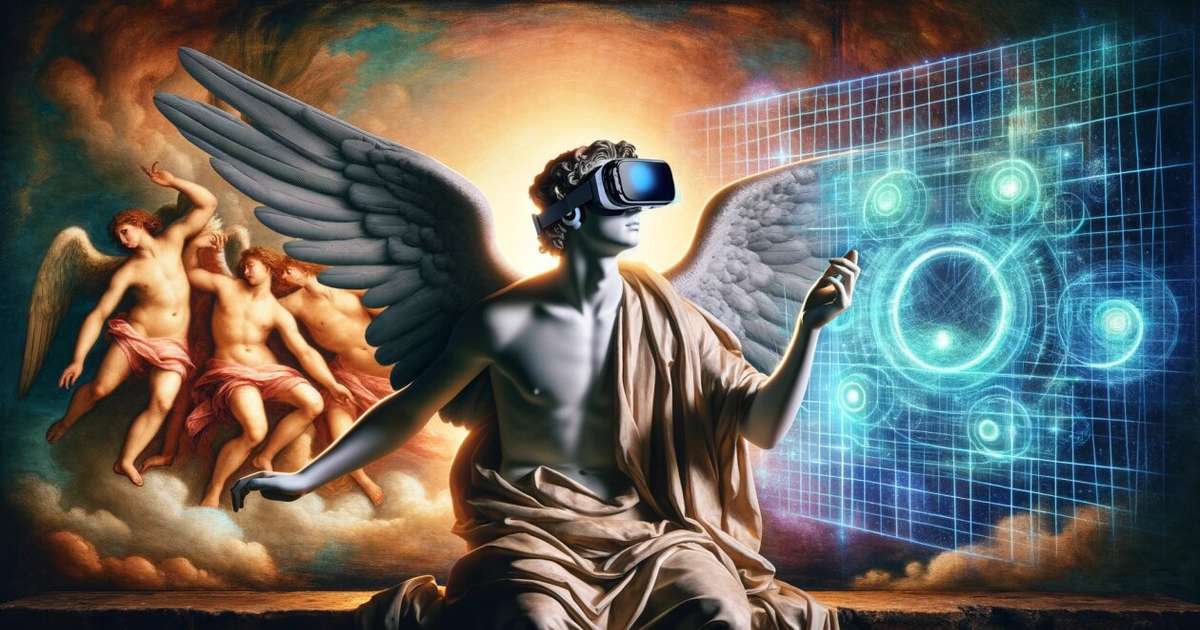Memento Mori: When Males Merge with AI
Belial, Behemoth, Beelzebub, Asmodeus, Satanas, Lucifer
The central concept of transhumanism might be summarized in a components: it’s attainable and fascinating to maneuver from a section of blind evolution to a aware one. Turning into a “homo faber,” as Anne Foerst says: taking management over an existence that for tens of millions of years has been dictated by intrinsic elements (organic, bodily, and cognitive limits) and extrinsic ones (cultural, spiritual, and ethical limits) and liberating oneself from human and divine evolutionary constraints. The transhumanist, from this standpoint, is Luciferian, as he rebels in opposition to creation, but in addition as a result of he brings data and progress (to keep away from misunderstandings, it ought to be remembered that Lucifer, earlier than changing into one of many names of the Satan as a consequence of Judaic-Christian cultural appropriation, was Phosphóros, “gentle bringer” and a star whose brightness heralded the daybreak). But when God is lifeless and the Übermensch isn’t but born, will superintelligence (‘überAI) be our evolutionary objective (or finish)? Will we’ve to begin coming to phrases with the inevitable, that’s, to outlive, our solely hope will likely be merging with AI?
Organic is the New N-word
Within the not-too-distant future, those that select to not merge with synthetic intelligence could be seen as we take a look at the Amish or the Korowai at present, whereas enhanced people can have an abyssal benefit over their diminished counterparts. A superpower. Will they (we?) lastly be übermenschen? And maybe, this means of hybridization has already begun. Silent however inexorable. Is there a distinction between utilizing ChatGPT to assist us throughout work or having a brain-computer interface (BCI) that transforms our mind inputs into outputs? Some argue there’s a distinction, as an implant would improve the flexibility to mix in a inhabitants of decreased people, overcoming the dichotomy between enhanced and never. They stay, in brief. And so they stay amongst us. And if I’m alive, then you might be lifeless. Nobody at present would complain that those that put on glasses have an unfair benefit over those that don’t. However what if this benefit had been hidden in an implant? The human eye has a decision of about 7 Megapixels, however what if we may improve it to 70? 700? 7,000? Consider a job that requires distinctive imaginative and prescient: an enhanced watchmaker and a diminished one would look an identical from the skin, however the former would work with superhuman accuracy. This might result in discrimination now not primarily based on ethnicity, gender, or faith however purely on the “organic versus synthetic” dichotomy. It may even be hypothesized, with some margin of security, that in 20-30 years, this would be the solely attainable discrimination.
AI and the issue of Techno-diversity
And to neologisms like “femicide” could possibly be added others like “diminished-cide”: “a type of violence systematically exercised not on ladies, however on diminished human beings within the title of an ideological superstructure now not patriarchal, however synthetic.” Will those that select to not merge with AI take their place within the ideological leper colony of tomorrow? In that national-populist leper colony, at present reserved for the gypsies, the LGBTIQA+ group, the political refugees? Accepting this chance will suggest dividing the human world into two classes, the place inevitably, one will take a place of predominance. And the way will we tackle the difficulty of the disappearance of range, a excessive worth to pay within the title of homogenization (albeit enhanced)? In a world the place all people are merged with the bogus, the richness of human range could be misplaced. We already see it with OpenAI. If everybody writes with ChatGPT (nearly 200 million customers as I work on this paragraph), everybody can develop into a author instantly. A purposeful illiterate turns into Hemingway due to immediate engineering. After we are all equal, all enhanced, then the battle for uniqueness and competitors might need to be bioengineered in a superhuman society. It is a stance that opens dystopian eventualities, and it’s not SF to foretell that, within the coming many years, governments and insurance coverage firms will promote AI integration to create a society of robots. Will we take a look at Homo sapiens as we take a look at Neanderthals at present? It is not laborious to foretell that, in 10-15 years, we would entry ChatGPT (or, within the case of a Neuralink BCI, extra possible, Grok/xAI) straight from our brains and even deliver again to life the brains of the deceased. As we are able to already get pleasure from an artificial meat burger from extinct animals (Australian meals firm Vow, for instance, managed to create a mammoth meatball), we would deliver historic figures, artists, and writers again to life. Nevertheless, The query stays whether or not these lifeless conform to be woke up.
Dying or deliberate obsolescence?
This anti-death idea already exists beneath the title of morphological freedom, that’s, now not being restricted by the pre-established boundaries of our physique, however having the ability to determine if and the place to switch our consciousness: into the cloud, onto a USB stick, into an exoskeleton, and so forth. An increasing number of firms are demonstrating, no less than embryonically and theoretically, that the know-how essential to fight the best taboo of our species – demise – could be only a few many years away. For us who work within the journey business, then, an extra income would additionally open up: when people start to divide between “bodily” and “uploaded,” we would should “open” digital lodges (as within the Amazon Prime sequence Add, the place the protagonist, upon his demise, is “uploaded” into the luxurious Lakeview lodge within the metaverse). Who will assume the function of mortiferous income supervisor? Certain, the difficulty of hospitality turns into frivolous within the face of even better questions that the defeat of demise would deliver. The primary amongst them is the spiritual one. Think about the influence it may have on religions like Hinduism, which foresees a number of cycles of reincarnation earlier than reaching Nirvana. Christian religion, then, facilities its total theoretical corpus across the existence of an afterlife and the soul’s resurrection. But when man turned immortal, then all the theological framework of perception would develop into out of date. And what if the second coming of Christ himself weren’t, in fact, the approaching of a TechnoChrist? If that “resurrection of the flesh” had been nothing greater than a prophecy for thoughts importing? “After they rise from the lifeless,” it’s written within the Gospel in line with Mark, “they’ll neither marry nor be given in marriage; they are going to be just like the angels in heaven.” We might be “angels” (ethereal and incorporeal beings, first clue) within the “heavens” fabricated from clouds (cloud computing, second clue), the place bodily and tactile relationships could be not possible (digital actuality, metaverse, spatial computing).
Memento Mori
Once more, the matrimonial components “until demise do us half” would lose all that means. What demise would separate {couples}? The bodily one? Digital suicide? Would marriage nonetheless have worth as soon as one’s consciousness is uploaded into the cloud? If my predictions are appropriate, my three-year-old son will stay lengthy sufficient to flee the annoying inevitability of demise. Earlier than his bodily departure, we would attain such know-how as to permit us to “select” whether or not to die and switch off our “important laptop” as soon as and for all or create a duplicate to “add” onto a special medium. Good for him, however is not this too quick a time to unravel these bioethical and theological questions? In the meanwhile, the difficulty remains to be (though more and more much less so) relegated to the pure discipline of hypothesis, however there are already firms that, albeit to a lesser extent, assure digital immortality or no less than the creation of digital twins, like Replika, a platform on which for years I’ve been making a twin of my father. Memento mori? Maybe. Or maybe solely till we neglect. Neglect to die.
The post Memento Mori: When Males Merge with AI appeared first on Havens travel and tour blog .




